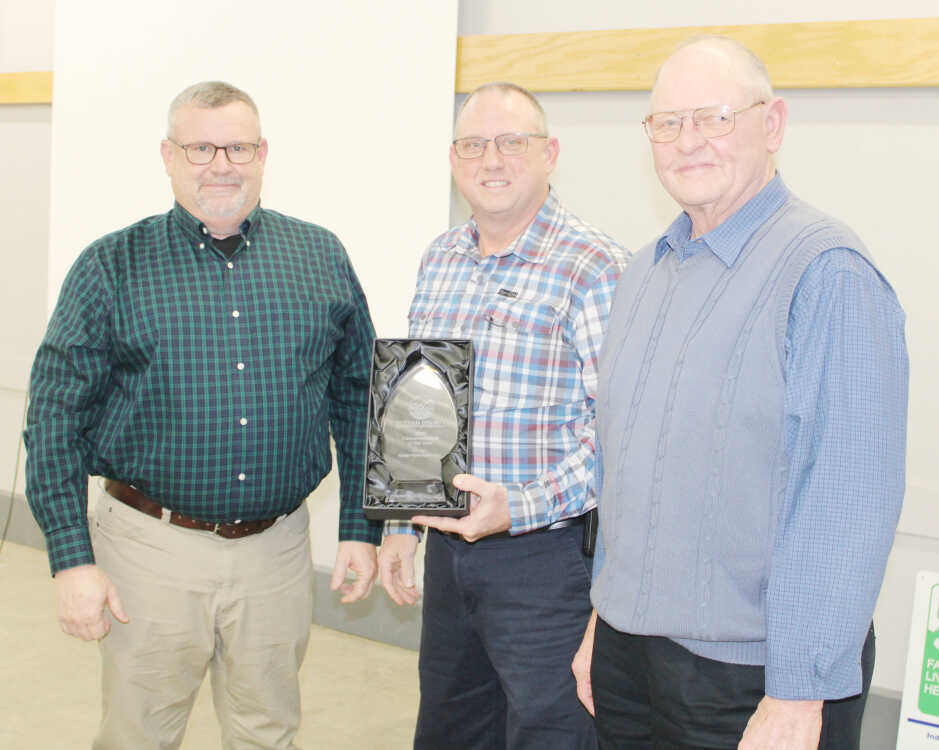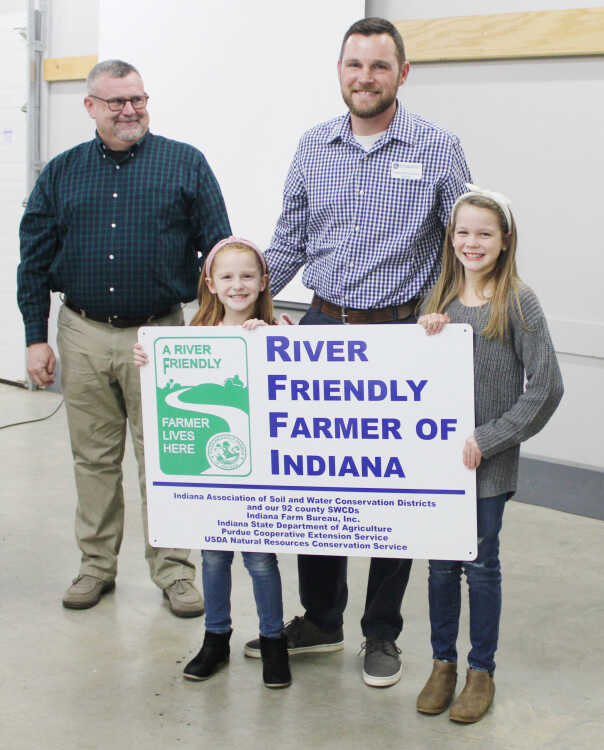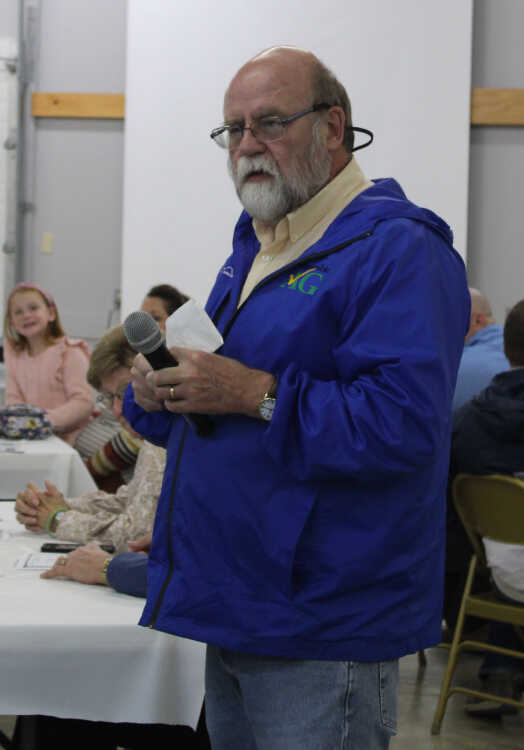Past, present of ag honored during joint annual dinner

Darwyn Nelson is more than a “friend of Extension” in Putnam County.
In some ways, his volunteer efforts at the Putnam County Fair and other Purdue Extension events over the years mean Nelson is Extension in Putnam County.
Either way, the veteran volunteer was honored Thursday evening as the annual Friend of Extension winner, along with other honors bestowed at the joint annual meeting of Putnam County Extension Service and Putnam County Soil and Water Conservation District.

While the majority of the night was devoted to a talk about the history of agriculture from Fred Whitford of Purdue University, there were some current-day matters to take care of, none of them bigger than Nelson’s award, which was a surprise.
Daughter Karen Nelson Heavin had to get him there under the auspices of one of his grandsons getting an award.
“I wasn’t going to come, and Karen said Brock was going to get an award,” Nelson said. “So I came for the grandkids, and then this happens.”
It’s hard to have attended the Putnam County Fair in the last 40-plus years and not have run across Nelson, whether it’s been his longtime roles as the announcer at the sheep show or as sidekick at Putnam County Ladies Day Purse Auction, Baker’s Best auction or 4-H Livestock Auction.
For many years he was also the “Ice Man” at the fair, coordinating the ice deliveries for the vendors, barns and families.
Along the way he’s also served as Putnam County Fair Board president, Sheep Barn superintendent, Harris Hall coordinator and 4-H Council member.
Though the award was a surprise, Nelson was able to give an impassioned speech on his thoughts about Extension and the Land Grant University system.
“The Land Grant College and Extension system in the United States has done its service for the U.S. and the world,” Nelson said. “It’s the future of what we call agriculture.”
“We need new leaders,” Nelson said, noting that those leaders are likely to have come through Extension programs. “I look around here and I see a lot of leaders from the past, but I also see a lot of leaders for the future.”
Up to speak later in the program, Whitford expressed his appreciation for Nelson’s passion.
“We need to get you up to Purdue to give that speech and remind them what we’re all about,” Whitford said.

Nelson was not the only honoree on the agenda, though, as SWCD also handed out its annual awards, which had been announced publicly in the district’s annual report, published in the Banner Graphic on Friday, Jan. 21.
Bill and Karen Beard were honored as the Woodland Owners of the Year. Bill Beard is known around the region for his former work as the coordinator of Sycamore Trails Resource Conservation and Development Council.
“I just want to thank the Putnam County SWCD for recognizing the resource of woodlands,” Bill said to an audience of more farmers than woodland owners. “We are very proud of our woods, as you are of your crop farms.”
Before taking his seat again, Beard also gave a bit of advice to any woodland owners: 1) Hire a professional forester, “someone who will work in your best interest,” and 2) always conduct a competitive bid process when harvesting timber.

Roger and Ron Sutherlin of Cedar View Farms were honored as the Conservationists of the Year.
“It is an honor, and we appreciate it,” Ron Sutherlin said. “The successes we have come from the knowledge of a lot people in this room and around the state.”
Ron went on to note that he and his father operate their farm with an eye toward the future.
“We look forward to many years of conservation and making the land better than it was when we started many years ago,” he concluded.

Another father-son team trying to operate responsibly with an eye to the future are Jim and David McGaughey, who were honored with the River Friendly Farmer award, which was actually announced during the 2021 Indiana State Fair.
While Jim McGaughey was in the Caribbean on the night of the meeting, David and daughters Abby and Madison accepted the recognizable River Friendly Farmer sign on behalf of the family — several generations of family.
“I learned to farm from my dad, who learned from his dad, who learned from his dad, who learned from his dad,” David said. “All on the same farm.”
And so it was fitting that the youngsters helped accept the award.
“Conservation is a tool we have that lets five generations stand here and say, ‘This is our farm and we’re proud of it,” he added.
As the current president of the SWCD Board of Supervisors, McGaughey was also part of saying farewell to retiring supervisor Kerry Ames and welcoming incoming member Chris Mann.
The Extension Board also had its annual election, with Karen Nelson Heavin and Amy Pennington each winning a second term on the board, while Skyler Clingan and Manuel Hartman were each elected to their first terms.

The night concluded with a talk on the history of agriculture from Whitford, who even had some photos from Putnam County and the surrounding area.
However, most of the photos were old enough that no one remembered the names involved, save one of Ruth Douthit walking her pet raccoon along a Greencastle sidewalk in 1933.
That spawned a lively exchange between Whitford and local historian/amateur comedian Jinsie Bingham.
“Do you know her?” Whitford asked the woman who was likely the oldest person in his audience.
“She’s dead,” Bingham replied.
Noting that the response was rather blunt, an exasperated Whitford tried another approach.
“Do you know her family?” he asked.
“They’ve ...” Bingham searched for the right words, “already passed to the other side.”
The audience roared, one of a number of such exchanges between the engaging Whitford and his audience.
Along the way, he provided a number of insights about what farming was like in Indiana from the 1800s up through World War II.
One such insight came from an old photograph of rail cars with farmers scooping lime by hand from the cars into their open wagons. Talking with a couple of local farmers, Whitford estimated the wagons might hold two or three tons, or about what each acre of farmland requires each time lime is applied.
This was followed immediately by another picture of a farmer, with several piles of lime at the end of a field, loading one of them — again by hand — into a spreader pulled by a team of horses.
“Can you imagine having to unload and return for every acre you owned?” Whitford asked. “Who would do that?”
“No one,” came the reply form the crowd.
And yet someone did, likely many ancestors of those gathered.
Along the journey, Whitford also shared how Extension had helped farmers become more productive in the past, from increasing corn yield by identifying which corn was actually still alive to helping identify which chickens were actually laying eggs, thus not wasting their feed.
Whitford also noted how Extension had helped the country through tough times, including starting community gardens during the Great Depression and teaching kids how to gather milkweed, the fiber of which was used for flotation devices during World War II.
However, he also wasn’t above poking some fun at Extension.
“You can always tell the one from Extension,” Whitford said looking at one photo. “He’s always the one in the suit and tie, no matter what he’s doing.”
Whitford is the author of four books on Midwestern agricultural history, all of which are avaiable at www.press.purdue.edu or by calling 800-848-6224, ext. 1.
